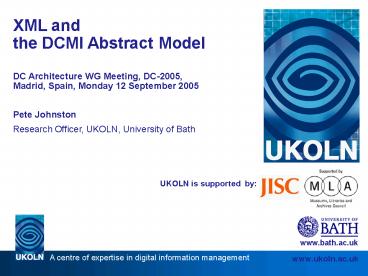XML and the DCMI Abstract Model - PowerPoint PPT Presentation
Title:
XML and the DCMI Abstract Model
Description:
XML attributes (values) Other non-DCMI XML bindings for DC deployed ... Same/similar concepts, different labels. DC-XML-2003 models and. DCMI Abstract Model (2) ... – PowerPoint PPT presentation
Number of Views:22
Avg rating:3.0/5.0
Title: XML and the DCMI Abstract Model
1
XML and the DCMI Abstract Model DC Architecture
WG Meeting, DC-2005,Madrid, Spain, Monday 12
September 2005 Pete Johnston Research Officer,
UKOLN, University of Bath
UKOLN is supported by
www.bath.ac.uk
2
DCMI Abstract Model and Bindings
- DCAM describes conceptual model for DC metadata
description set - types of construct
- relationships between constructs
- Description sets encoded/serialised as records
- Binding describes mapping between constructs in
conceptual model to components in syntax - Two way
- encoding application description set -gt record
- decoding application record -gt description set
3
DCMI Abstract Model and XML
- DCMI provides multiple "encoding guidelines"
specifications - XHTML, RDF (Simple, Qualified), XML
- Guidelines for implementing Dublin Core in XML
(2003) - DCMI Recommendation
- XML binding for DC metadata
- Mapping between constructs in conceptual model to
components in XML syntax - XML elements (names, content),
- XML attributes (values)
- Other non-DCMI XML bindings for DC deployed
4
DC-XML-2003 and DCMI Abstract Model
- DCAM Appendix C
- features of DCAM supported by DC-XML-2003
- However, DC-XML-2003 pre-dates DCAM
- maps conceptual models to XML
- but does not map DCAM to XML
- provides own models
- "Simple DC Record"
- "Qualified DC Record
- DC-XML-2003 models different from DCAM
5
DC-XML-2003 models and DCMI Abstract Model (1)
- Same/similar concepts, different labels
DC-XML-2003 DCAM
"record" description
"property and associated value" statement
"value" value string
6
DC-XML-2003 models and DCMI Abstract Model (2)
- Concepts present/omitted
DC-XML-2003 DCAM
resource URI
value URI
multiple value representations
rich representations
related descriptions
description sets
types of "record"
7
DC-XML-2003 models and DCMI Abstract Model (3)
- Concepts conflated
DC-XML-2003 DCAM
"encoding scheme" vocabulary encoding scheme, syntax encoding scheme
8
Problems
- Attempts to encode/decode conceptual constructs
not present in DC-XML-2003 models - resource URI
- value URI
- vocabulary encoding scheme/syntax encoding scheme
distinctions
9
DC-XML-2003 models and DC-XML-Binding (1)
- Syntax examples with no mapping to DC-XML-2003
models (section 6) - ODRL, IMS-LRM XML fragments
- XML sub-tree constructed according to rules of
second XML format - XML sub-tree has no interpretation in DC-XML-2003
- Contradicts rationale for specification
- error in specification?
10
DC-XML-2003 models and DC-XML-Binding (2)
- Binding "encoding schemes" to XML Schema
datatypes - XML Schema datatypes apply to XML element
content, XML attribute values - syntax encoding schemes?
- but default type always present?
- Datatype derivation problems
- trying to introduce support for rich
representations at syntax level
11
Problems
- Section 6 encourages merging of arbitrary XML
fragments - hybrid document with no interpretation
- "undermines" mapping to DCAM!
- Mapping "encoding schemes" to XML Schema complex
types - can't work for both vocabulary encoding schemes
and syntax encoding schemes - Complex Type derivation problematic for some
tools
12
Proposal
- XML binding for DC explicitly based on DCAM
- subset of DCAM?
- full DCAM?
- including review of use of XML Schema datatyping
- Early drafts
13
Questions
- Stay with (extended) DC-XML-2003?
- emphasise that supports simpler model?
- Maintain both (extended) DC-XML-2003 and
DC-XML-2005? - emphasise that different models supported
- Deprecate DC-XML-2003 and move towards support
for DC-XML-2005 only?
14
XML and the DCMI Abstract Model DC Architecture
WG Meeting, DC-2005,Madrid, Spain, Monday 12
September 2005 Pete Johnston Research Officer,
UKOLN, University of Bath
UKOLN is supported by
www.bath.ac.uk































